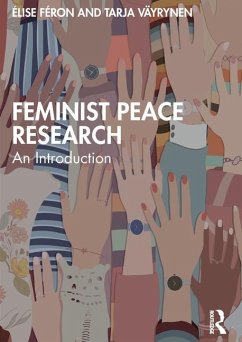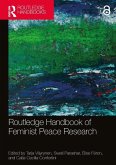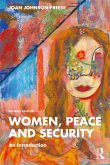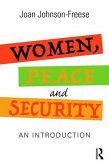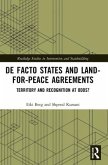This textbook provides a comprehensive overview of the field of gender, feminism and peace.
It is based on the argument that feminist thinking is necessary to understand and analyse the core issues in peace and conflict studies and is fundamental to thinking about solutions to global problems and to promoting peaceful conflict transformation. The book centres alternative and critical approaches missing in mainstream peace research and brings forward feminist perspectives on traditional peace research topics such as militarism, peacekeeping, arms trade and the articulation of different forms of violence. It also advances critical and alternative issues and topics that traditional peace research has sidelined, including, for example, artificial intelligence, technologies and peace; trauma and memory; human-non-human species relations; art; popular culture; post-colonial and decolonial feminist perspectives; and the queering of war and peace. In sum, this textbook contributes to the visibility of these feminist critical approaches to peace research and makes them accessible to scholars and students interested in the subject.
This book will be of much interest to students of peace studies, feminist theory, gender studies and International Relations.
It is based on the argument that feminist thinking is necessary to understand and analyse the core issues in peace and conflict studies and is fundamental to thinking about solutions to global problems and to promoting peaceful conflict transformation. The book centres alternative and critical approaches missing in mainstream peace research and brings forward feminist perspectives on traditional peace research topics such as militarism, peacekeeping, arms trade and the articulation of different forms of violence. It also advances critical and alternative issues and topics that traditional peace research has sidelined, including, for example, artificial intelligence, technologies and peace; trauma and memory; human-non-human species relations; art; popular culture; post-colonial and decolonial feminist perspectives; and the queering of war and peace. In sum, this textbook contributes to the visibility of these feminist critical approaches to peace research and makes them accessible to scholars and students interested in the subject.
This book will be of much interest to students of peace studies, feminist theory, gender studies and International Relations.
'This textbook is one of the top eye-opening books every scholar and practitioner involved in conflict resolution should read. In these terrible times, it is unique in at least three regards. First, it puts into question most preconceived ideas on war and peace. Second, it dissects embodied interactions and gendered dynamics during and after mass atrocities. Third, it boosts determination to favour collaboration and mutual support leading to everyday peace. An outstanding exercise of reflexivity.'
Valérie Rosoux, University of Louvain, Belgium
'This is an extremely valuable and highly-accessible contribution to the literature on Peace and Conflict Studies. Feminist research agendas have led the way on many aspects of peace and this book provides an excellent state-of-the-art summary on multiple themes. It will be a ''must add'' to many reading lists.'
Roger Mac Ginty, Durham University, UK
'The timeliness of this textbook cannot be overstated. I have been in the Peace Studies field for over twenty-five years and have longed for a feminist textbook since the beginning of my career. What Élise Féron and Tarja Väyrynen have delivered is nothing short of extraordinary: a comprehensive introduction to the vast feminist work on peace and violence. In their nuanced and rich chapters on the variety of topics that feminists have tackled, they show how feminism transforms peace studies in multiple ways: it broadens our understanding of peace and violence to include subjects too often sidelined by the field; it challenges some of the premises or assumptions of much of peace studies work (for example, clear-cut peace-war cleavages); and it exposes the silences and marginalizations that the field has perpetuated, elevating actors and ways of thinking, which might well provide the world with alternative models for peaceful and just futures.'
Catia C. Confortini, Wellesley College, USA
'Féron and Väyrynen have done us a huge favour by writing this brilliant book that brings together the concepts and ideas that have both enthused and troubled feminists invested in the futures of peace. For all those interested in Feminist Peace Research, this much needed book would be a valuable resource and the very first important milestone in their journey.'
Swati Parashar, University of Gothenburg, Sweden.
Valérie Rosoux, University of Louvain, Belgium
'This is an extremely valuable and highly-accessible contribution to the literature on Peace and Conflict Studies. Feminist research agendas have led the way on many aspects of peace and this book provides an excellent state-of-the-art summary on multiple themes. It will be a ''must add'' to many reading lists.'
Roger Mac Ginty, Durham University, UK
'The timeliness of this textbook cannot be overstated. I have been in the Peace Studies field for over twenty-five years and have longed for a feminist textbook since the beginning of my career. What Élise Féron and Tarja Väyrynen have delivered is nothing short of extraordinary: a comprehensive introduction to the vast feminist work on peace and violence. In their nuanced and rich chapters on the variety of topics that feminists have tackled, they show how feminism transforms peace studies in multiple ways: it broadens our understanding of peace and violence to include subjects too often sidelined by the field; it challenges some of the premises or assumptions of much of peace studies work (for example, clear-cut peace-war cleavages); and it exposes the silences and marginalizations that the field has perpetuated, elevating actors and ways of thinking, which might well provide the world with alternative models for peaceful and just futures.'
Catia C. Confortini, Wellesley College, USA
'Féron and Väyrynen have done us a huge favour by writing this brilliant book that brings together the concepts and ideas that have both enthused and troubled feminists invested in the futures of peace. For all those interested in Feminist Peace Research, this much needed book would be a valuable resource and the very first important milestone in their journey.'
Swati Parashar, University of Gothenburg, Sweden.

